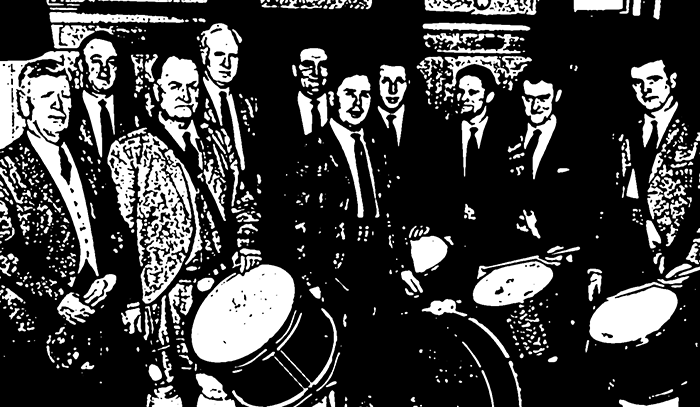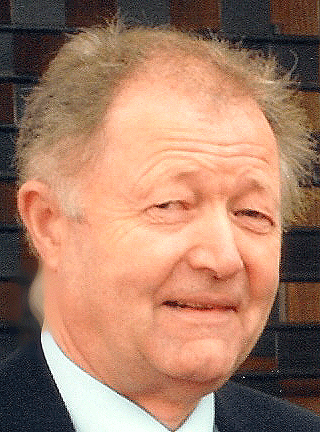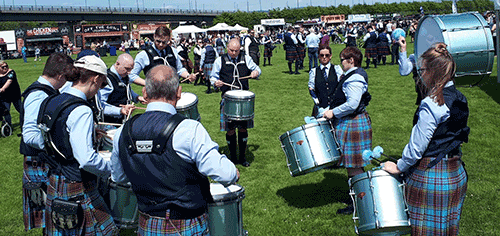
It is clear that all the individuals mentioned in these three articles all had a desire to improve drumming technique and were committed to influencing the musical interpretation of bagpipe melodies. They worked together towards these interests, although there is also evidence in the papers that during the 1930s and 1940s there was resistance from pipers and other drummers to some of their ideas.
There is no doubt that their efforts did lead to pipe bands gradually being accepted as musical combinations. Even during the 1950s and 60s, however, there continued to be resistance to the concept of pipe band ensemble – ensemble adjudication was not introduced to SPBA Major Championships until 1970. Despite a rocky start it has continued to survive ever since.

By Alistair Aitken OBE
It was interesting to read AD Hamilton’s comment that in the early days he ‘always felt that each of the grades were actually running two contests, one for the pipers and one for the drummers and never the twain shall meet’. He considered that this was really due to a lack of interest in each other’s activities, and it did not surprise him that interested spectators took a different view from the adjudicators as the spectators were listening to the band as a complete unit and the adjudicators were only hearing one side of the performance.
Some might argue that this still applies to an extent among players and spectators, and that some people consider that the combined musical performance of bands should be left solely for the ensemble adjudicator to decide. If you stand unnoticed among the spectators at any pipe band contest you can still overhear drummers commenting only on the drumming technique and degree of difficulty of the drum corps; and pipers who comment only on technical aspects of the piping, note errors and the piping tone.
There may also still be drummers who are interested primarily in winning the drum corps prize. Undoubtedly, however, there are now many more people among the spectators and players who consider band performances from a combined musical perspective.
There may also still be examples of these situations among adjudicators although, throughout my almost 20 years involvement in adjudicator training, all new RSPBA piping and drumming adjudicators were always encouraged not to judge their discipline in isolation, but in a ‘pipe band’ context (even when there was also an ensemble adjudicator). The reasoning was that the piping can be affected by the drumming and vice versa due to aspects such as tempo, integration and interpretation variances; and we used many examples of pipe band recordings to illustrate how this could happen. The bigger challenge, of course, was in trying to ensure that the adjudicators complied in practice with this advice.
There is no doubt that the subject of pipe band ensemble has always been contentious since the concept was mooted in these early days. Alex Hamilton’s argument was quite simple; that a pipe band should be judged both technically and musically as a collective group of pipers and drummers.
One of the problems possibly has been different interpretations of pipe band ensemble within the RSPBA, the pipe band community and other countries. During our time in adjudicator training Pipe Major Bob Shepherd MBE and I spent many hours trying to analyse these interpretations. We concluded that pipe band ensemble can be viewed in two ways.

Firstly, a pipe band is a musical ensemble in its own right as it is a combination of instruments (i.e. bagpipes and drums) performing together. We also concluded, however, that pipe band ensemble, as it has come to be known, is more of a process which embraces assessment of technical accuracy, integration, sound balance and combined musical effect, all in terms of the collective pipe band. With the benefit of hindsight, arguably this process might more accurately have been defined from the outset as ‘pipe band orchestration’. We also concluded that the traditional practice of teaching piping and pipe band drumming as separate disciplines has probably not helped develop a holistic pipe band mentality.
It is also interesting to read the early references to the SPBA Pipe Band College, bearing in mind that the RSPBA announced in 2018 the formation of a Pipe Band College independent of its Music Board, the impression possibly being taken by some that this was an entirely new development. The papers show that, although attempts were made to establish an SPBA Pipe Band College during the 1930s, it was not until 1947 that it actually happened.
The initial concept of separate Piping and Drumming Colleges lasted only a year before a joint College was formed. At that time there was also a separate SPBA Advisory Committee comprising prominent Pipe Majors and Leading Drummers. It was subsequently decided that the respective remits of the College Board and the Advisory Committee were of such a similar nature that duplication of activities (and duplication of membership) were causing problems rather than solving them, so in the early 1980s they were amalgamated to form the RSPBA Music Board which still exists today. In effect, therefore, between the early 1980s and 2018 the role of the Pipe Band College was incorporated within the Music Board. The Pipe Band College is now a separate RSPBA committee once again.
There are various conclusions which can be drawn from the papers. Clearly these individuals were all men of vision and ahead of their time. The papers also show that there have always been differences of opinions but also a great deal of agreement; that progress is often due to the efforts of only a few individuals; that pipe band adjudication will probably always be controversial and will probably always be criticised; and that things have a tendency to go round in circles over the years with history having a habit of repeating itself.
The latter demonstrates that there is always value in researching and considering the history of any organisation or activity. Before making any change it is always worth reviewing if the idea, concept or procedure has been considered or introduced before; whether it is worthwhile and still needed; and, if so, whether it actually needs to be changed or can be done more effectively and efficiently in a different way. Most organisations and businesses these days publish glossy annual reports which focus on highlighting their successes. Few of them acknowledge where things have gone wrong or have not been successful, nor do they address how the failures could be turned into success.
One aspect which is clear is that, despite all the arguments and politics over time, the SPBA/RSPBA has survived as an organisation with its original aims and objectives still intact after over 90 years. It is unfortunate that 2020 has proved to be a major impediment for the Association and for the pipe band community generally to overcome; and that 2021 could yet prove to be no better. Hopefully things will improve soon for everyone.
- Type ‘Pioneers’ into the search field to read the earlier excerpts in this series.















